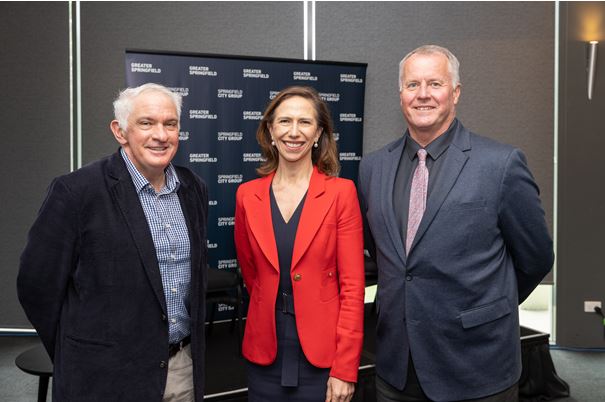
Education experts converged on Australia’s fastest growth corridor in July to tackle solutions to the rapidly evolving digital transformation in education as universities confront an era of change.
Springfield City in southeast Queensland hosted key thought leaders on the tertiary sector at its inaugural Future of Education Series on July 20, discussing the threat of digital disruption to universities and renewing the focus on the health and wellbeing of students post COVID.
More than 70 industry leaders gathered at picturesque Brookwater Golf & Country Club as the latest views on digital disruption to student learning at both K-12 and university level were discussed by an expert panel, that tackled key issues including the evolving thread of digital disruption in the tertiary sector, declining levels of student mental health and renewing a focus on critical thinking in schools.
The Future of Education Series panel included child and adolescent psychologist Doctor Michael Carr-Gregg; Brisbane Girls Grammar School Principal Jacinda Euler; Hymba Yumba Independent School Principal Peter Foster; and Go1 Learning VP Education Dan Fish.
Series moderator Richard Cawood said business leaders, educational professionals, government leaders, and technologists were examining the transformed education sector up to the world of 2030.
“We all agreed the existing models of teaching and learning need to change but we also agreed we will never go 100 per cent online or digital because interacting with other humans is what makes us human,” Cawood said.
“The education sector has seen more change in the last 10 years than the last 100 years and that is largely because of technology and COVID. We need to create an education system that no matter what technology comes along, we still know how to keep the human at the centre.”
Dr Carr-Gregg told the gathering he was grappling with significant disengagement in learning since the pandemic lockdowns ended.
“The prevalence of mental health problems among young people were already very high pre-pandemic and 65% of those with mental health problems do not seek help,” Dr Carr-Gregg said.
“Schools and parents need to work together to address these issues. The areas of immediate concern include sleep, diet, exercise, and social media. The solution lies in building resilience and authoritative parenting skills.”
Brisbane Girls Grammar School Principal Jacinda Euler said students must be emboldened with a sense of hope and optimism post pandemic with educators given an important role in the transformation occurring.
“With a sense of negativity pervading much of our public dialogue, instilling in our students a sense of hope and optimism for the future is essential. We know that Gen Z are optimistic, just as they are, generally, compassionate, determined and imbued with a sense of purpose,” Euler said.
“As educators, we teach students how to use these qualities to drive societal change, lay the groundwork for innovation, solve current and predict future challenges, and in doing so, contribute to a more just world.”
Panellist Dan Fish, Director of global employee learning platform Go1, told the Series the recent explosion of online data was challenging traditional models of learning.
“There is a lot of information out there and it is forecast that in this year alone 94 zettabytes of data will be in existence,” Fish said.
“That is profound. But what is even more interesting is about 85 per cent of that data will have been created in the last two years alone. Given the amount of data being created, does this mean our current data set will be obsolete in the next four to five years?”
Springfield’s Hymba Yumba Independent School Principal Peter Foster said his indigenous school was remodelled for 21st century learning, becoming a finalist in the Australian Education Awards in 2022.
“We talk about being leading in two worlds, for our jarjums to lead in culture and thrive in a modern, digital world,” Foster said.
“Over the last two and half years, we have remodelled $6m worth of buildings to enhance 21st century learning. Every classroom has AI, and you can virtually run a class anywhere in the world. A teacher can record a lesson and download it to watch it later and learn from it.”
Springfield City Chairman Maha Sinnathamby said Springfield City has brought together some of the nation’s leading educators to discuss how to adjust our thinking in a rapidly changing world.
“In Springfield City, we have set the scene with our Knowledge Precinct, built on health, education and technology. We’re creating a space in which innovation, entrepreneurship, design and collaboration are interconnected,” Sinnathamby said.
“This will lead to the growth, exchange and development of ideas that will not only enhance our region but the nation and beyond.”
This article originally appeared as a media release and has been edited for length.


